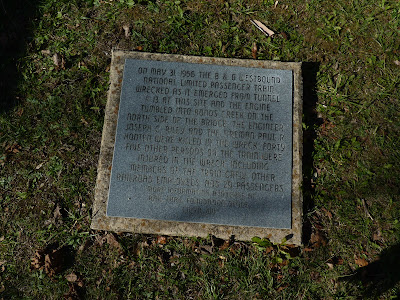We finally got on the right track and found the last tunnel we were looking for, tunnel #13, or the Bond's Creek Tunnel. It was possible to drive almost right up to it, and after walking 3 miles or so the wrng way (but finding the cool abandoned tunnel in the process) I was ready for easy.
The road bordered the trail for a good distance, right through the almost abandoned town of Cornwallis--which was named, of course for the Revolutionary War British general by that name. Why he was memorialized in a small Virginia town (we weren't West Virginia yet when this little town was formed, probably in the very early 1860's) I don't know.
 |
| One of several abandoned homes along the trail |
 |
| You can see by the doorlight windowthat this was once a very nice house. |
I believe this might be what's left of a water tower.
Someone has started renovating this old house.
This tunnel was one of the tunnels improved in the early 1960's by B&O in the clearances project to make it taller and wider. At 352 feet it is not very long, but it does have a slight curve. It is approached by crossing a bridge over Bond's Creek.
 |
| North tunnel portal |
On Memorial Day, May 31, 1956, the B&O westbound National Limited passenger train passed through the tunnel, and as it came around the curve in the tunnel found that a rock slide was partially blocking the tracks. There was no time to stop. The train slammed into the rock pile as it emerged from Tunnel #13. The engine fell off the tracks and fell off the side of the bridge into Bond's Creek Forty-five people were injured in the crash, and the engineer, Joseph C. Riley, and the fireman, Paul R. Hooten, died in the wreckage. Among the injured were members of the train crew, railroad employees and 29 passengers.
| From North Bed Rail Trail brochure |
Today the tunnel is a serene place, filled with birdsong and the sound of water rippling in the nearby Hughes River.
There is a shelter just outside the tunnel, a perfect place to picnic. We have plans to go back and do just that--Larry can fish in the river and I can write in the shelter, and we'll have a picnic too. The day we were there it was quiet with no other visitors, but I imagine in summer it might be a busy place, with bikes, walkers, and horses passing by.
That was the last of our adventures on the North Bend Rail trail for this trip, but we plan to go back and see the other 5 tunnels sometime and learn their history as well. Such fascinating stuff, and it's free for the finding!
Copyright Susanna Holstein. All rights reserved. No Republication or Redistribution Allowed without attribution to Susanna Holstein.

















Oh those old, old abandoned homes!!!!! Scary but fascinating... -smile-
ReplyDeleteSad story connected with this tunnel for sure. But, that's why it is still known.
⛄🔥⛄🔥⛄
Those who built the railways endured terrible working conditions across the world. So many were killed or maimed so that some of us could get from A to B a little more quickly.
ReplyDeleteI lived in Cornwallis as a child in 1980...we used to play in and all around the railroad track and the tunnel. There used to be a small store in Cornwallis where we would buy ice cold bottles of Coke..to quench the Dog Days of August thrist. Cornwallis had a 1 room school house where people of the area attended all grades of public school, all together in the same, small schoolhouse.
ReplyDeleteHow interesting--so the town was inhabited as late as that. It looked like it had been deserted for years, really. I would love to have seen it back when you were growing up there.
DeleteMy husband was the Grandson of Joseph Riley, the Engineer. It is a beautiful yet eerie area for the family.
ReplyDeleteI am so sorry that your family had this tragedy. It must feel strange when you visit the site. I hope most visitors take a moment to remember those brave men who lost their lives in the wreck.
Delete